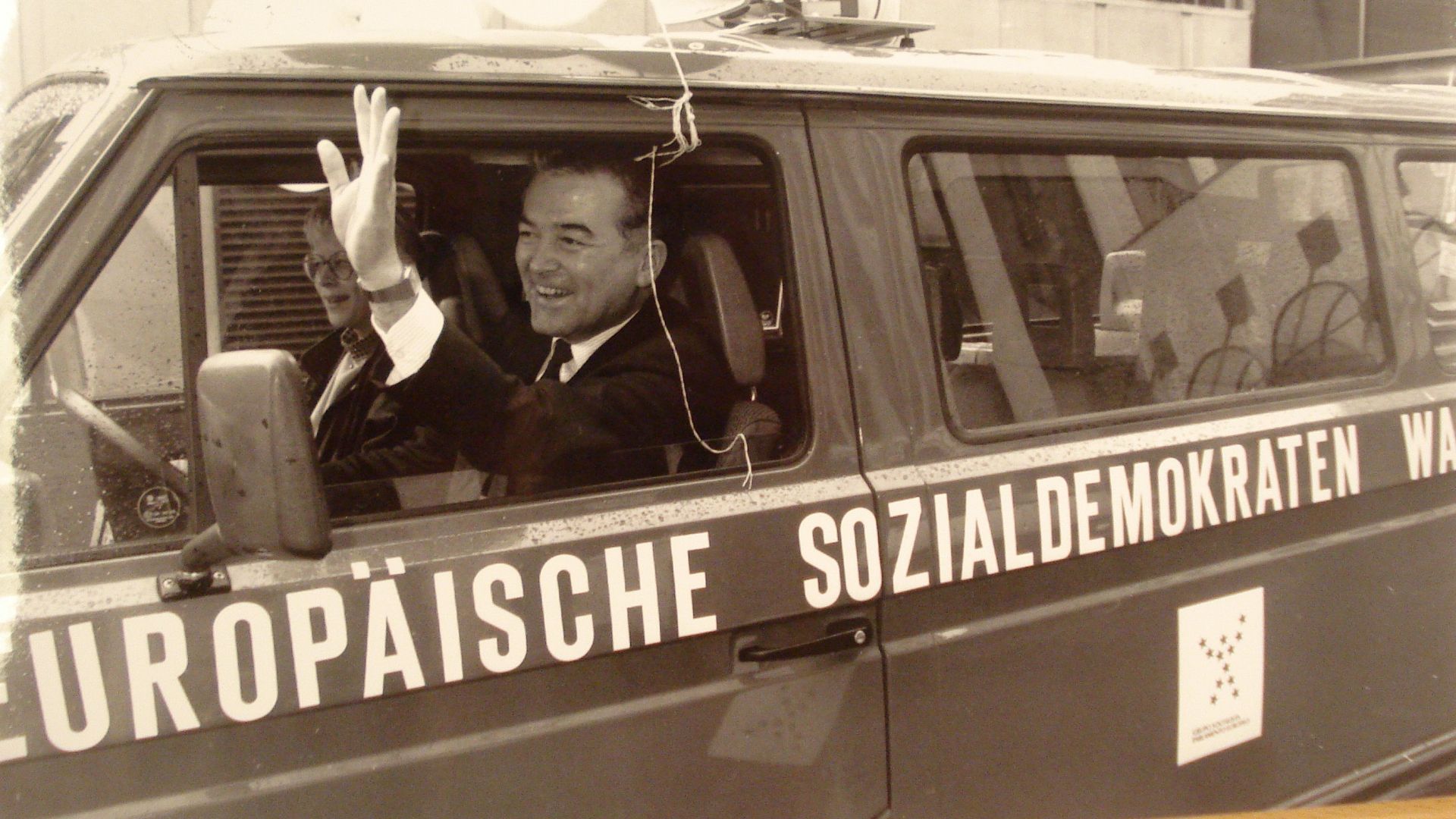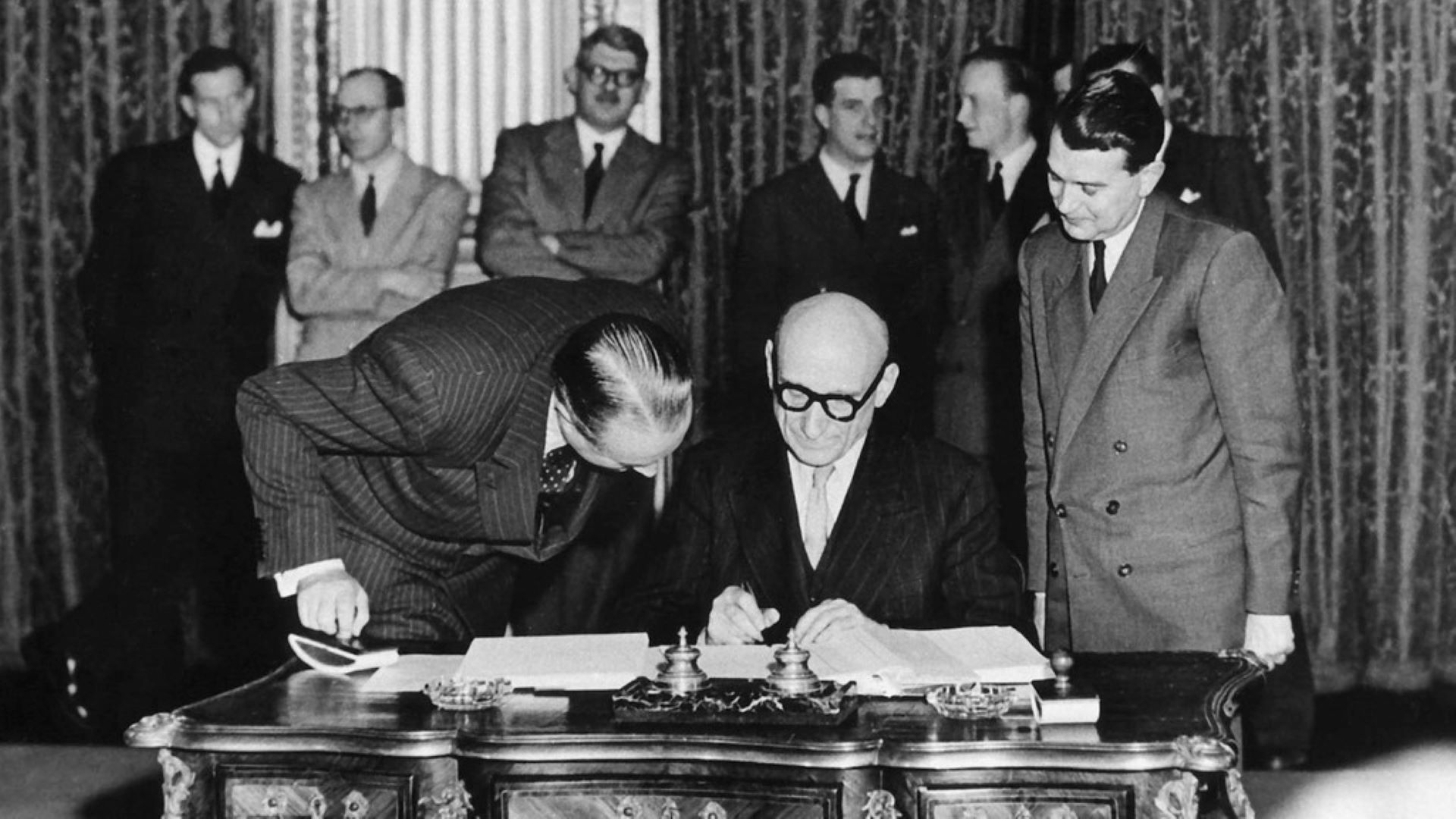
Here we provide an overview of the extensive history of the Progressive Alliance of Socialists and Democrats in the European Parliament (S&D Group), which has played a crucial role in shaping the policies of the European Parliament since its formation in 1953. The S&D Group has left an indelible mark on the political landscape of the European Union, with significant milestones that have impacted the organisation and direction of the Group. Beginning as a Socialist Group in the Common Assembly of the European Coal and Steel Community in 1953, the S&D Group has now emerged as one of the most influential political groups in the European Parliament.
Image: Foreign ministers signing the Treaty of Paris, 1951
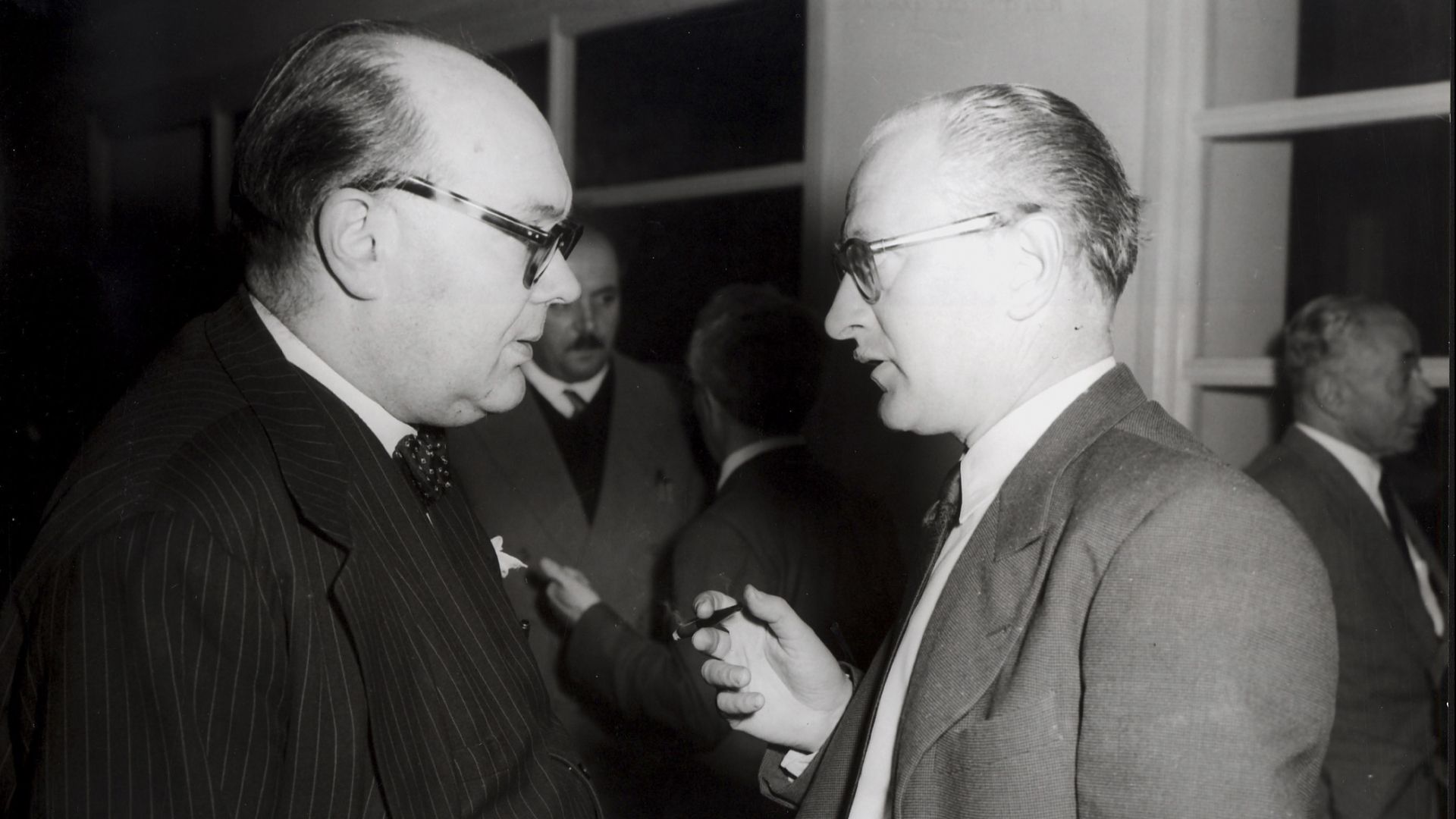
In the early 1950s, Robert Schuman proposed the European Coal and Steel Community (ECSC) plan, which would eventually grow and evolve into the European Union. Socialist Paul-Henri Spaak from Belgium became the first president of the ECSC Common Assembly.
During the same period, European socialists re-established ties and came to be known as the Socialist International. The organisation set up a Study Group on European Unity, and after meetings between July 1951 and August 1952, the Special Commission agreed on a ten-point policy towards a European Coal and Steel Community, marking the first transnational socialist party policy on European integration.
As a result, the Socialist Group in the Common Assembly of the European Coal and Steel Community was founded in September 1952 by the national parties of the six member states. Within a year, the Socialist Group established a bureau and a permanent secretariat in Luxembourg, with Guy Mollet (SFIO France) elected as president of the Group. This followed the precedent of cooperation established within the framework of the Socialist International and the Consultative Assembly of the Council of Europe.
Image: Paul-Henri Spaak & Guy Mollet, 1953
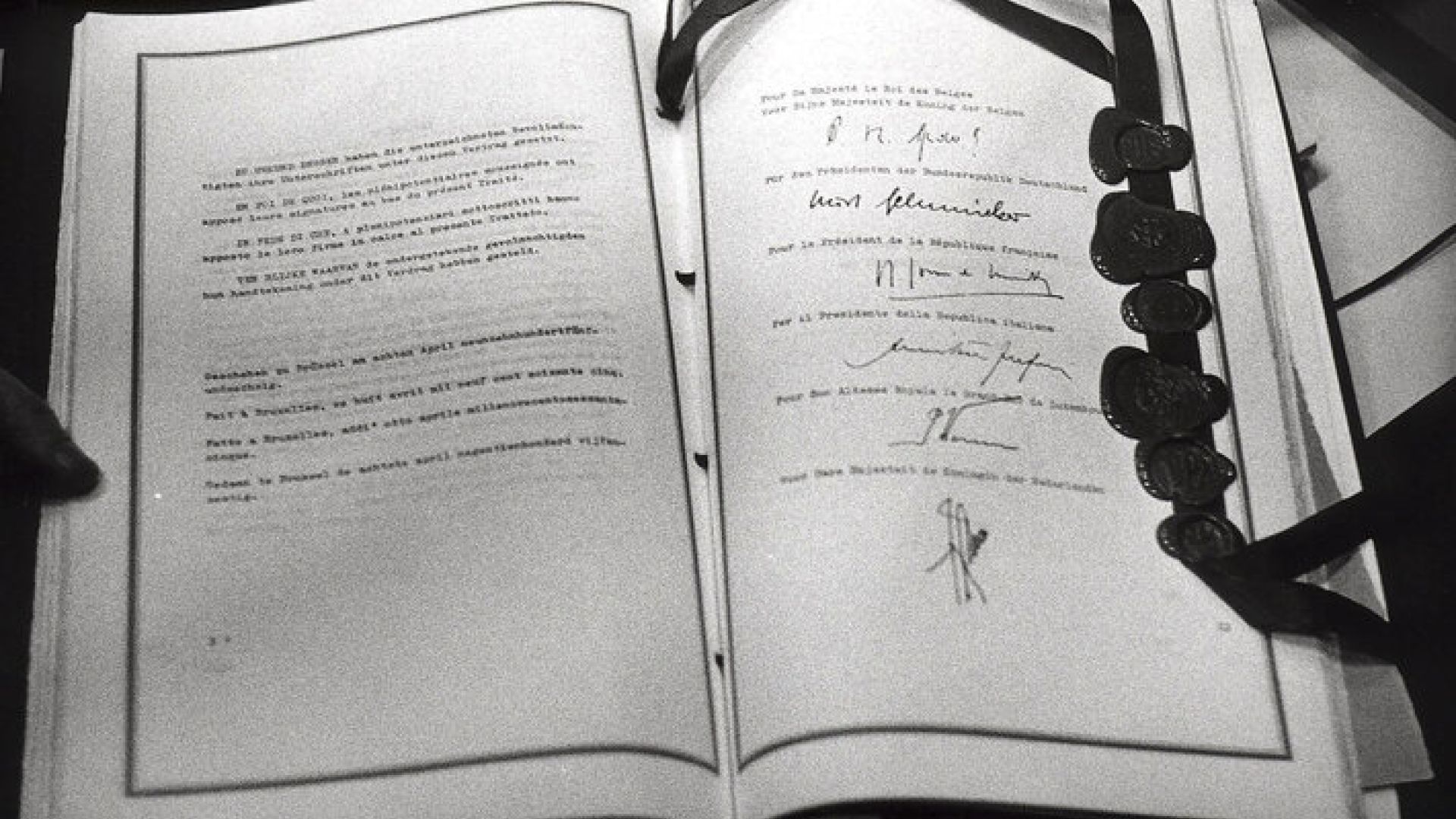
In the mid 1950s, negotiations had started for two new treaties - the European Economic Community (EEC) and the European Atomic Energy Community (EURATOM). In addition to Schuman, several other prominent politicians were involved in the creation of the EEC and EURATOM treaties. Paul-Henri Spaak, for example, played a key role in the negotiations and was one of the architects of the Treaty of Rome.
In 1957, the Treaty of Rome was signed, which officially established the EEC and laid the foundation for the future European Union. The Socialist Group played a key role in advocating for a stronger social dimension to the treaty, which ultimately led to the inclusion of provisions on social policy and workers' rights. One of these provisions was the European Social Fund, which provided financial support for social and employment programmes throughout the European Union. The socialists were also in favour of the abolition of trade barriers, but only with guarantees of protection for European workers. This was a significant step towards the creation of a single European market focused on social rights.
In 1965, the Merger Treaty was signed, which merged the institutions of the European Coal and Steel Community, the EEC and EURATOM into a single entity known as the European Communities. The Socialist Group supported this treaty, which helped to create a more united and integrated Europe.
In the first 16 years of its existence, the Socialist Group had six presidents: Guy Mollet, Hendrik Fayat, Pierre Lapie, Willi Birkelbach, Käte Strobel, and Francis Vals.
Image: The Merger Treaty, 1965
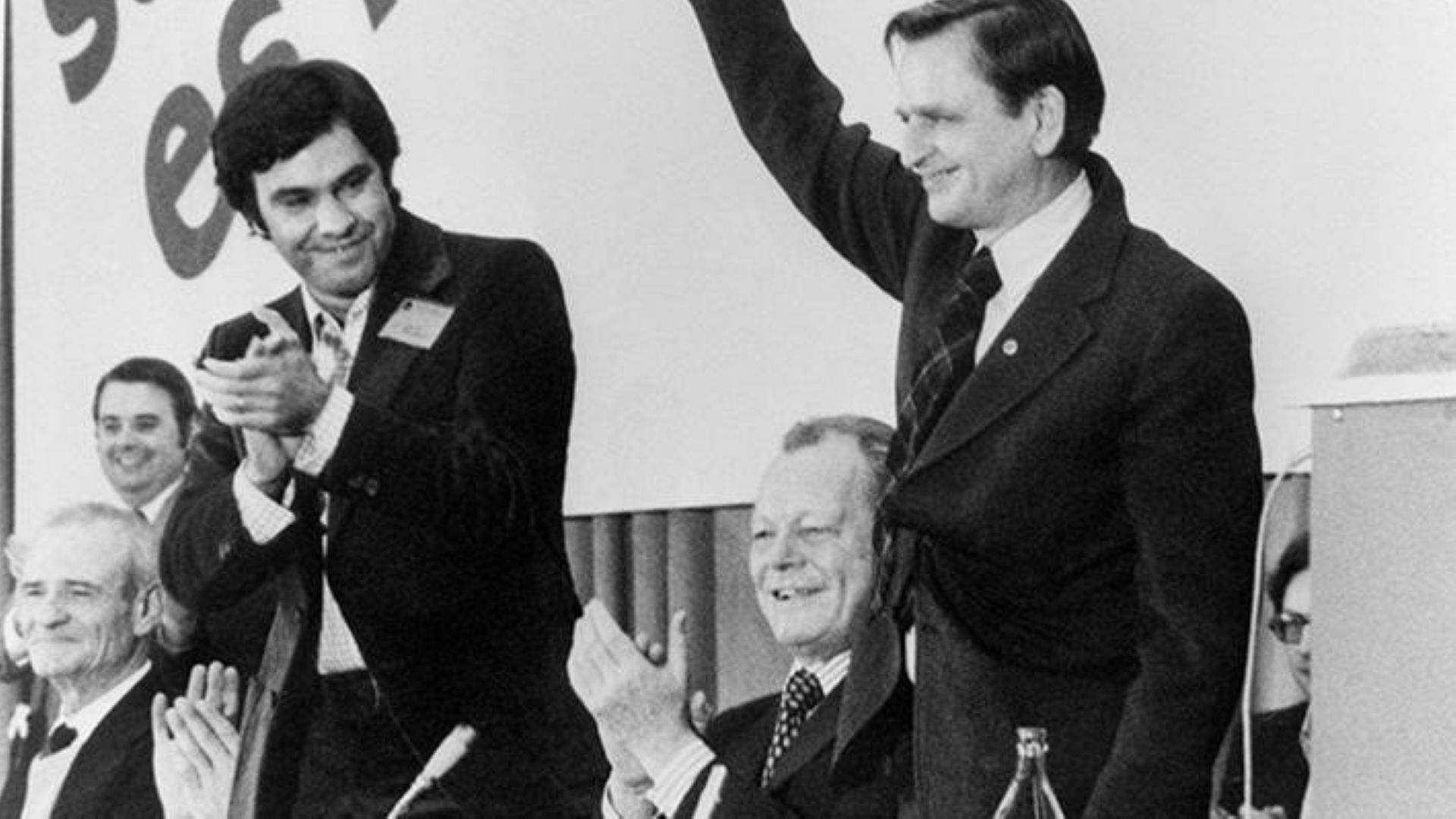
Throughout the 1970s, the Socialist Group actively promoted the idea of an economic and monetary union and, in 1972, the Group presented its own plan for a monetary union in Europe.
In 1973, the UK, Ireland and Denmark joined the European Communities, leading to an expansion of the Socialist Group. At the end the decade, the first direct elections to the European Parliament took place, and the Socialist Group emerged as the second largest group in the Parliament.
In 1974, the Group was renamed as the Socialist Group in the European Parliament following the establishment of the European Parliament. During this period, the Socialists Group worked to promote peace and democracy around the world. The Group was a vocal opponent of the Vietnam War and supported efforts to bring about an end to the conflict. The Group also supported movements for democracies in Spain and Portugal, which led to the overthrow of their authoritarian regimes.
Key focus points of the socialists during the 70s were: the development of the social dimension of the European Community; the right to work through safeguarding full employment; a Community industrial policy; a more human environment through common health and safety standards; social security through the standardisation of social benefits; income distribution and asset utilisation through a Community incomes policy.
Image: Felipe Gonzáles, Willy Brandt, and Olof Palme, 1976

The early 1980s were marked by economic crises and the emergence of new right-leaning parties with national-focused policies across Europe. In response, the socialist parties at the national level united against this new wave of right-leaning parties. In 1981, the Socialist Group grew in size as more left-leaning parties joined the European Parliament and supported European integration.
In 1984, the Socialist Group supported socialist Jacques Delors as president of the European Commission, marking the beginning of a close relationship between the two. Delors' presidency was marked by significant contributions to the European Communities, one of which was his advocacy for the creation of the European Single Market. He played a key role in negotiating the Single European Act of 1986, which aimed to remove barriers to trade, capital, and labour across the EU. The creation of the single market helped to increase economic growth and create new jobs in many European countries, which in turn had positive impacts on social policies.
In 1989, the Group endorsed the candidacy of Jacques Delors for a second term as President of the European Commission, and he was successfully re-elected. Additionally, the Group supported the enlargement of the European Communities to include new member states from Southern Europe.
Image: Socialist members campaigning for the European Social Charter, 1989
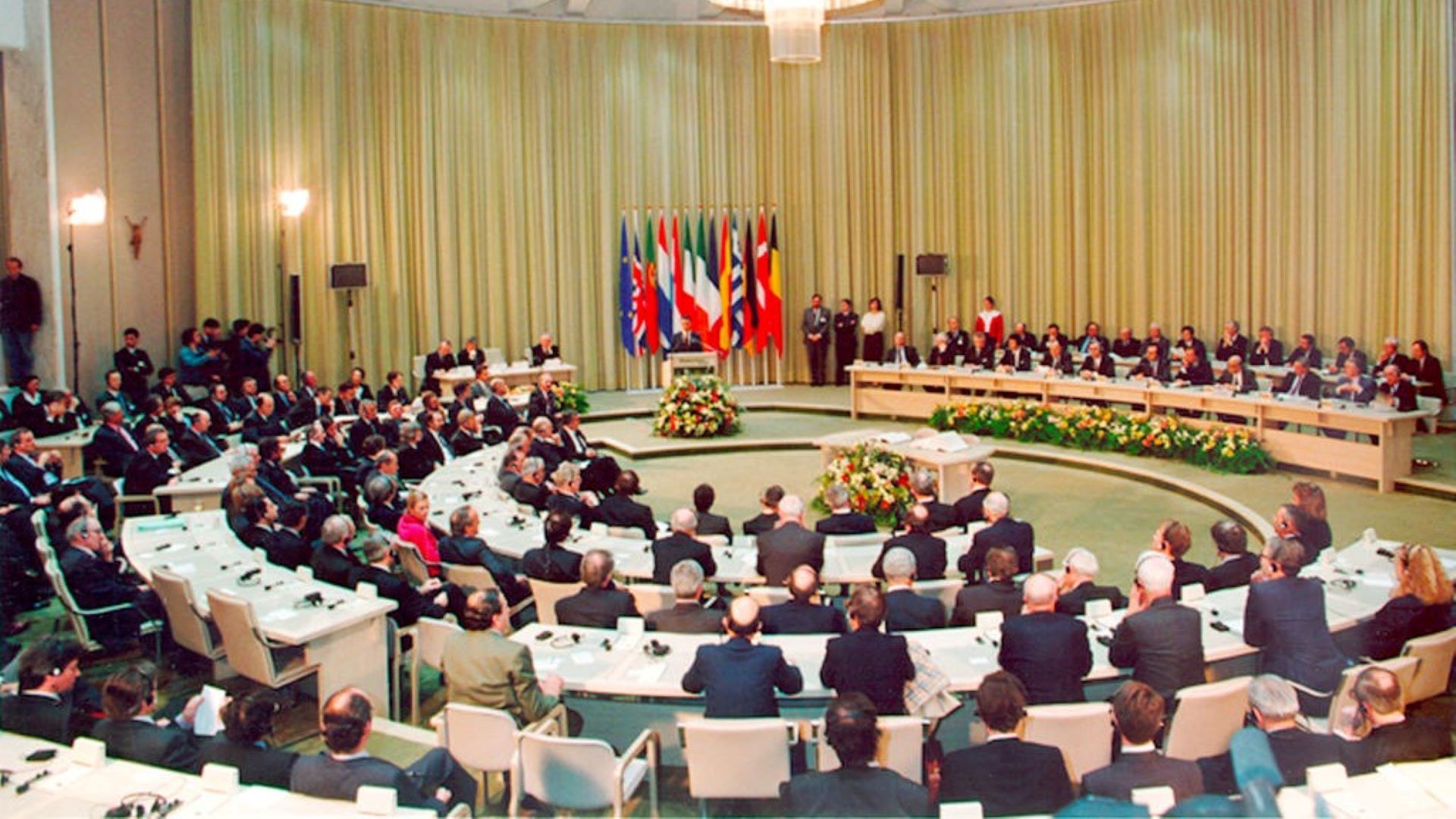
During this period, the Socialist Group continued to promote social democratic policies and support the European integration process. One of the larger issues on the agenda of the socialists was the resurgence of nationalism, xenophobia, and racism against immigrants coming to EC countries. The PES Group responded to these challenges by promoting policies aimed at advancing social cohesion and integration, including support for measures to combat discrimination and promote diversity, as well as efforts to improve access to education, training, and employment opportunities for immigrants and other marginalised groups.
In 1992, the Maastricht Treaty was signed, creating the European Union and establishing the framework for economic and political integration. The Socialist Group played an active role in the negotiations leading up to the treaty and supported its adoption. In November of the same year, the Party of European Socialists (PES), a transnational socialist organisation made up from members of European socialist parties, was born. Consequently, the Socialist Group was renamed to the Group of the Party of European Socialists (PES Group) to show the relationship between the two organisations.
Leading up to the 1994 elections, the PES Group focused on seven key areas in the new European Union: creating jobs, gender equality, protecting the environment and consumers, creating peace and security, regulating immigration and fighting racism, fighting organised crime, and working for democracy. The PES Group won a significant amount of seats and became the largest group, with Pauline Green (UK) as chairwoman.
The idea of the single currency had been supported by the socialists decades earlier, and so during this period the PES Group supported the introduction of the euro as a single currency for the European Union, which would see it being created a few years later. The PES Group, who were firm believers in EU enlargement, played a significant and active role in the accession process of new member states from Central and Eastern Europe years later. By advocating and supporting their inclusion, the Group was pivotal in advancing European integration, fostering stability, and promoting prosperity in the region.
Image: Signing of the Maastricht Treaty, 1992

The 9/11 terrorist attacks had a significant impact on global politics, and the EU was not immune to these changes. One effect of the attacks was that the PES Group, a political party at the EU level, began to prioritise global cooperation and cultural exchange. At the same time, there was a rise of far-right populist parties in the EU parliament, which emphasised national policies and anti-migration policies. This trend was evident in the emergence of populist parties in EU member states such as the UK, Denmark, and the Netherlands.
In 2004, Martin Schulz took over as leader of the PES Group, which had become the second-largest political group in the European Parliament once again. To emphasise the group's parliamentary work and distinguish itself from the PES, it was renamed the Socialist Group in the European Parliament. Later, in 2009, the group underwent another name change to become the Group of the Progressive Alliance of Socialists and Democrats in the European Parliament (S&D Group), reflecting a desire to be more inclusive of national member parties.
The Charter of Fundamental Rights of the European Union was proposed by the European Convention in 2000, with the drafting process lasting until its incorporation into the Treaty of Lisbon in 2009. Throughout this period, the Socialists were strong advocates of the charter. Their efforts were instrumental in negotiating the content of the Charter and ensuring its inclusion in the final version of the Treaty. The Charter has since become a key document in the protection and promotion of fundamental rights in the European Union.
Image: Former MEP, Jo Leinen and former S&D Group President, Martin Schulz, 2001
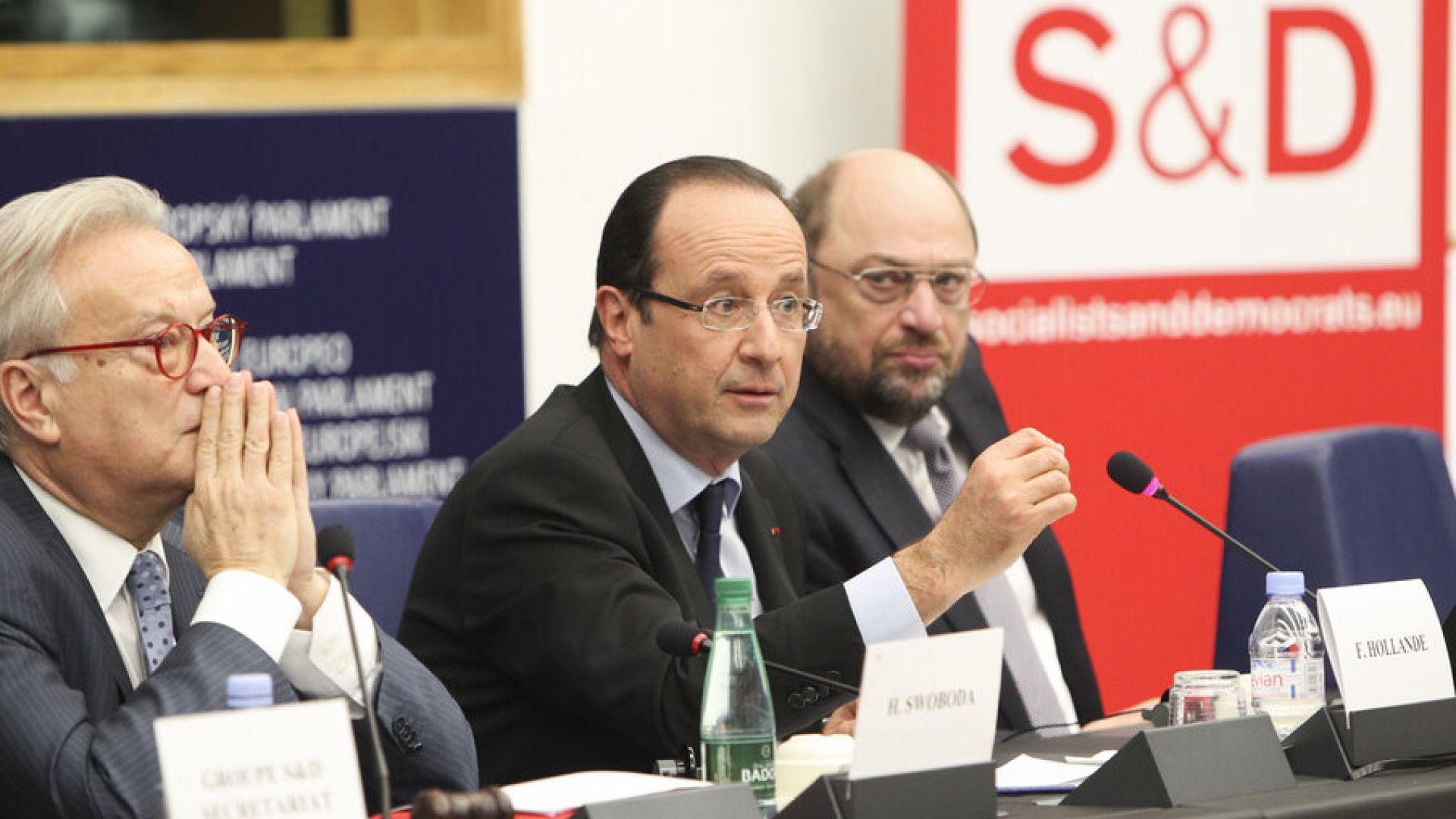
Between 2010 and 2019, the S&D Group continued to play a significant role in shaping European politics. In 2010, the Group strongly advocated for the establishment of a Financial Transaction Tax, which aimed to curb speculation and contribute to the EU's budget. During the same period, the S&D Group supported the establishment of the European Stability Mechanism to prevent future financial crises and to safeguard and provide assistance for member states.
In 2014, the Group was instrumental in the election of Jean-Claude Juncker as President of the European Commission, which marked the first time the Commission President was chosen based on the results of the European Parliament elections. During this period, the S&D Group also played a prominent role in advocating for social justice and workers' rights, and pushed for a stronger and more cohesive European Union.
The S&D Group president successors of Martin Schultz, up until the 2019 elections, were Hannes Swoboda, Gianni Pittella, and Udo Bullmann.
The S&D Group, currently under the leadership of Iratxe García Pérez, maintained their position as the second-largest political group in the European Parliament following the 2019 elections. One of the key priorities for the S&D Group in the 2019-2024 term had been the implementation of a European Green Deal, which aims to make the EU carbon-neutral by 2050. The S&D Group has also been working to promote a fair and just transition to a low-carbon economy; one which ensures workers and communities are not left behind.
Image: Former S&D Group President, Hannes Swoboda, Former French President, François Hollande, and President of the European Parliament, Martin Schultz, 2013

The S&D Group in the European Parliament has been highly active in the current legislative term. During this period, the Group has been involved in a number of important initiatives and policies such as the Green Deal, the Digital Services Act, and the COVID-19 pandemic response.
In 2020, the Group focused on responding to the pandemic by advocating for a coordinated EU response and supporting measures to protect citizens and workers. In 2021, the S&D Group was instrumental in securing a European Parliament resolution calling for the suspension of COVID-19 vaccine patents to increase global access to vaccines. The Group has also been active in promoting social justice and sustainability, such as by advocating for the Just Transition Fund and pushing for ambitious climate targets.
In 2022, the situation in Ukraine took a turn for the worse when Russian forces launched a brutal invasion, violating Ukraine's sovereignty and territorial integrity. This aggression by Russia was widely condemned by the international community, and the European Union responded with a series of measures to support Ukraine and put pressure on Putin's Russia.
The S&D Group, as one of the largest political groups in the European Parliament, has been particularly vocal in its condemnation of Russia's actions and its support for Ukraine. The Group has consistently called for sanctions on Russia and for the EU to take a strong stance in support of Ukraine's sovereignty. This includes supporting measures to deepen political and economic ties between the two regions, as well as providing humanitarian assistance to those affected by the conflict in eastern Ukraine.
Check out the list of our top priorities here
Image: S&D President, Iratxe García Pérez, in Parliament
The S&D Group's 70th anniversary film celebrates our 70-year journey and commitment to social justice. The film highlights our achievements in promoting equality, fairness, and progress in Europe and beyond, including legislation on workers' rights, gender equality, and environmental protection. Watch it for an inspiring message of hope and progress towards a more just and equitable future.
Enrique Barón Crespo, former President of the Socialist and Democrats Group, tells us about the importance of the Group in recent years and the role it should play in the future, as part of the celebrations for the 70th anniversary of the Socialist and Democrats Group in the European Parliament.
Discover the rich history of the S&D Group through this captivating slideshow video. Take a journey through the last 70 years of the S&D group's contributions to the development of the European Union, from its establishment in 1953 to the present day. This video showcases historical photographs of iconic moments such as the signing of the Treaty of Rome and the establishment of the European Parliament, as well as notable figures who have played significant roles in the S&D Group's development. Watch the slideshow and get a glimpse into the S&D Group's commitment to fighting for social justice, equality, and democracy in Europe.

